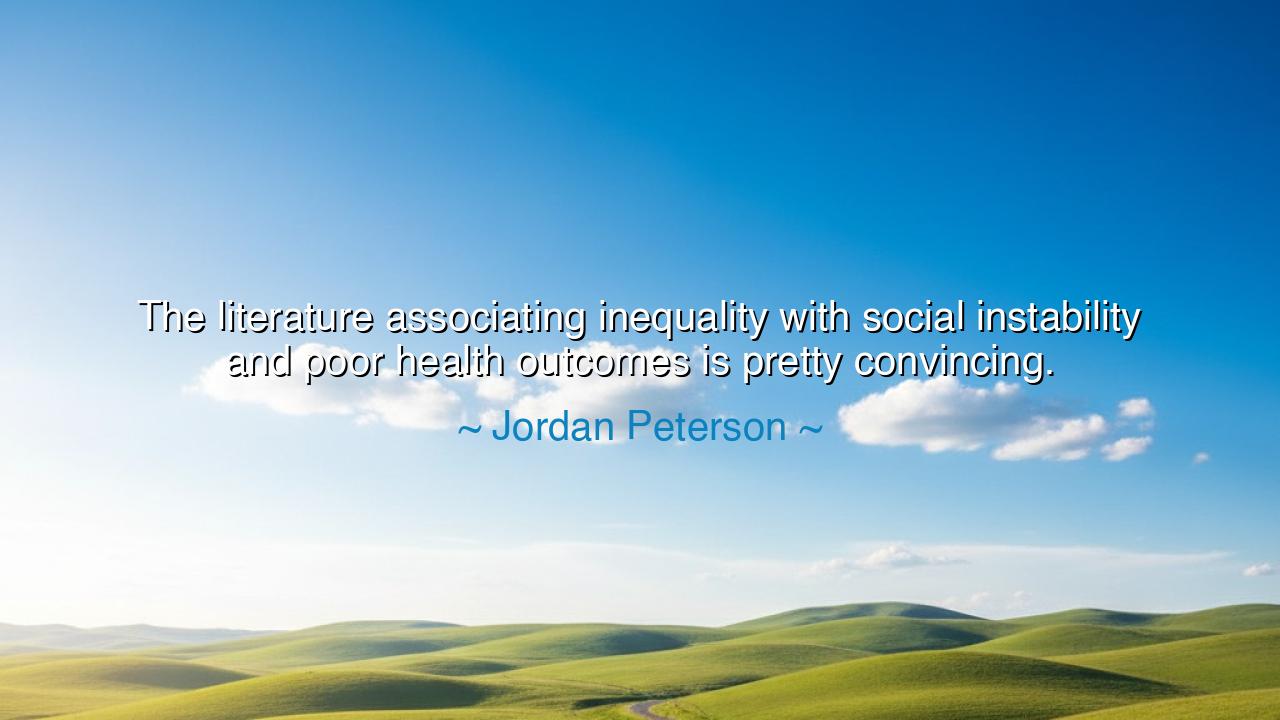
The literature associating inequality with social instability and
The literature associating inequality with social instability and poor health outcomes is pretty convincing.






“The literature associating inequality with social instability and poor health outcomes is pretty convincing.” Thus spoke Jordan Peterson, a thinker who has long gazed into the patterns that govern both the individual and the collective soul of humanity. In this statement, calm and scholarly on the surface, there burns a deeper warning: that the imbalance between men—of wealth, of opportunity, of dignity—creates not merely social division, but spiritual and physical decay. For when one part of the body grows sick, the whole body suffers; so too when one segment of society languishes in want, the harmony of all is broken.
To understand inequality as Peterson invokes it, one must look beyond numbers and wealth. Inequality is not merely the difference between rich and poor—it is the widening gulf between those who feel they belong and those who feel abandoned. It is the growing separation between the powerful and the powerless, between those who live with purpose and those who live in despair. And just as a wounded limb weakens the whole creature, so too does inequality breed instability, distrust, and ill health throughout a nation. The data of science may describe it, but the wisdom of the ancients already knew it: a city divided against itself cannot stand.
Consider the story of Rome, that mighty empire which once ruled the world. Its roads stretched across continents, its armies conquered nations, and its coffers overflowed with gold. Yet within Rome, inequality grew like a poison vine. The few lived in marble palaces while the many starved in the streets. Bread and circuses were offered to distract the masses, but hunger of the spirit cannot be silenced with games. Corruption spread, the citizens’ faith in justice waned, and soon the empire that had conquered the earth could no longer govern itself. Disease, violence, and despair followed—the very poor health outcomes that Peterson’s insight warns of. Rome did not fall from foreign swords alone—it collapsed from within, undone by its own imbalance.
The connection between inequality and health is not only metaphorical, but deeply physical. When people live in constant comparison and struggle, their minds become anxious, their hearts burdened. The poor bear the weight of insecurity, while the wealthy, fearing loss, guard their towers with paranoia. Communities fracture. Violence becomes the language of the unheard. Studies show what history already reveals: that societies with greater inequality suffer higher rates of disease, depression, and mortality. For the soul of a people, like the soul of a person, requires harmony to remain well. Where envy and exclusion thrive, vitality withers.
Yet this is not a message of despair, but of awakening. Peterson’s words do not condemn humanity—they call it to responsibility. Inequality need not lead to ruin if those with power act with compassion, and those without rise with purpose. The ancients spoke of justice not as revenge or balance of punishment, but as harmony—the alignment of all parts of society so that each may fulfill its role in peace. The ruler must care for the weak, the worker must act with integrity, and the citizen must uphold truth over resentment. When this moral fabric is torn, health falters, and chaos takes root.
Consider also the modern story of Scandinavia, where nations such as Sweden and Denmark, though imperfect, strive to reduce inequality through education, healthcare, and civic responsibility. There, citizens live longer, trust one another more, and report greater happiness. These societies show that equality, when tempered with freedom and responsibility, creates not mediocrity but strength. Social stability, as Peterson’s observation suggests, is not born from sameness, but from shared dignity—a recognition that all lives have worth and that the flourishing of one depends upon the flourishing of all.
Therefore, let this truth be passed down: a society’s health mirrors the balance of its people. When the strong lift the weak, both are ennobled; when the rich remember the poor, both are redeemed. But when one class builds towers while another digs graves, the storm of instability will surely come. The wise must learn that their own well-being is bound to the well-being of their neighbors, that peace cannot exist amid resentment, and that the healing of the world begins with justice in the heart.
So, my child, remember the lesson of Peterson’s words: inequality is not merely an economic condition—it is a moral disease that corrodes both body and soul. Do not seek only your own prosperity, but the health of the whole. Treat others not as competitors but as companions on the shared journey of life. For only in unity, fairness, and compassion can a people stand strong. When all rise together, no one need fall—and in that harmony lies the truest form of health, both for nations and for the human heart.






AAdministratorAdministrator
Welcome, honored guests. Please leave a comment, we will respond soon